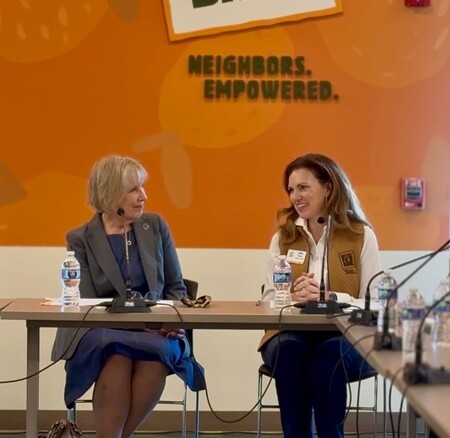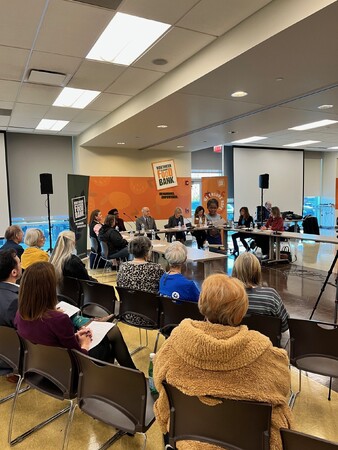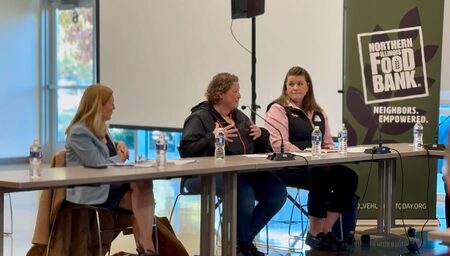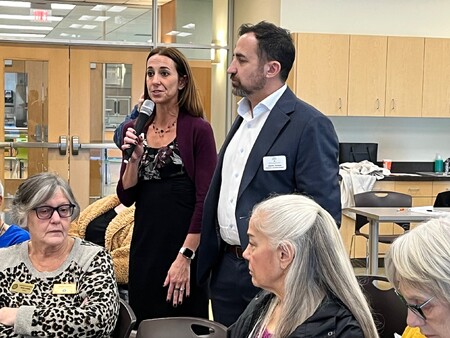
Kane County Leaders Convene Roundtable on Food Access and SNAP Benefits
The Kane County Board Chairman, along with the Northern Illinois Food Bank, hosted a public roundtable discussion Friday to address growing concerns over reductions to the Supplemental Nutrition Assistance Program (SNAP) and their impact on local families, seniors, and veterans.
The event brought together a coalition of federal, state, and community leaders, including Congressman Bill Foster, Congresswoman Lauren Underwood, State Senator Linda Holmes, State Representative Anna Moeller, and Julie Yurko, President and CEO of the Northern Illinois Food Bank. Also in attendance were county officials, school district representatives, and local food pantry directors—each providing insight into how food insecurity is affecting Kane County communities.
Chairman Corinne Pierog opened the discussion by underscoring the importance of addressing food access as a matter of both equity and economic stability. 
More than 60,000 Kane County residents currently receive SNAP benefits. Every dollar in SNAP benefits generates up to $1.50 in local economic activity, supporting grocery stores, farmers, and small businesses alike.
Results of the Kane County Health Department’s Community Health Improvement Plan found food access as a central priority. The report defines food access as the ability of families to obtain enough nutritious food without sacrificing other basic needs such as housing, transportation, or medication.
According to the Health Department, one in seven Kane County residents reports low access to fruits and vegetables, and half cite cost as the primary barrier.
“When your life is upside down, it’s hard to know where to turn,” said Julie Yurko, President and CEO of the Northern Illinois Food Bank. “For every one meal we provide, nine are provided through SNAP. That’s how essential this program is to keeping people fed and families stable.”
Yurko added that the Northern Illinois Food Bank has a system to track activity at more than half the food pantries it serves. From the first week in October to the first week in November, weekly visits increased from 63,000 to 80,000, reflecting the growing strain on food resources across the region.
While hunger is a year-round problem, demand increases sharply during the holiday season, particularly among children, seniors, and people with disabilities. Local food pantries are calling for community support to keep shelves stocked and ensure no one goes hungry this winter.
Eileen Pasero, Executive Director of the Batavia Interfaith Food Pantry, said the pantry is seeing twice as many families as in prior months and is working to increase the amount of food provided to ensure every household has enough to get by. Pasero said the community has stepped up to meet the challenge: the pantry is receiving daily calls from groups interested in organizing food drives or making financial donations, and volunteer participation has also risen.
Residents can help by:
• Donating food or funds to local food pantries or the Northern Illinois Food Bank
• Sharing information and resources with neighbors who may be facing food insecurity
Participants at the roundtable described the real-world consequences of reduced SNAP funding, from seniors facing malnutrition to children struggling with focus and development due to hunger.
Also sharing her story was Tina, a Kane County resident who has relied on SNAP benefits for the past two years to help feed her family. She works part-time as a caregiver for an elderly couple and part-time at a local bus company, yet said that with inflation and the rising cost of food, it’s still difficult to make ends meet. 
“Each month I receive around $294 in SNAP benefits,” Tina said. “It’s how we’ve been able to afford groceries and still keep up with our other bills.”
The superintendents of U-46 and East Aurora School Districts were also at the roundtable, as was the Kane County Regional Office of Education. 
“When students’ basic needs aren’t met, learning inevitably suffers,” said Katie Algrim, Assistant Regional Superintendent at the Kane County Regional Office of Education. “If a child is worried about where their next meal is coming from, that becomes their top priority—not homework or test scores."
There was also discussion about changes coming to the SNAP program. The Budget Reconciliation Bill passed in July includes funding cuts to the program through 2034. The changes will expand work requirements to previously exempt groups—including adults ages 55–64, parents and caregivers, veterans, and homeless individuals—who will now need to meet work-reporting criteria to maintain eligibility.
Other policy shifts include:
• Shortened time limits: New applicants will qualify for six months of benefits instead of twelve
• Immigrant restrictions: Some humanitarian immigrants, such as refugees and asylum seekers, will face narrower eligibility
• Proof of shelter costs: Households must now provide documentation of housing expenses to calculate benefits
SNAP is 100% federally funded and provides benefits to 1.9 million Illinois recipients. Illinois administers roughly $350 million in SNAP benefits each month.
As the discussion turned toward federal and state policy, Chairwoman Pierog invited Congressman Bill Foster and Congresswoman Lauren Underwood to share their perspectives on SNAP funding and oversight.
The roundtable concluded with a shared commitment among participants to strengthen partnerships across government, nonprofit, and community organizations—ensuring that no Kane County resident goes hungry due to policy decisions beyond their control.
To learn more about food insecurity, where to find a food pantry or where to donate, go to https://solvehungertoday.org/

